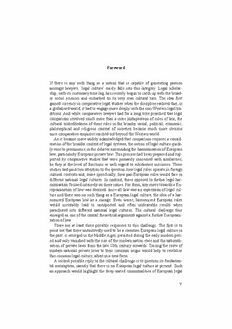
Towards a European Legal Culture PDF
399 Pages·2014·4.933 MB·English
Most books are stored in the elastic cloud where traffic is expensive. For this reason, we have a limit on daily download.
Preview Towards a European Legal Culture
Description:
European harmonization efforts - such as a European civil code, European constitutional treaties, European principles, and European fundamental rights — are frequently criticized for building on or creating a European legal culture that does not exist. In reality, what we have is European legal pluralism. Some have argued that the pluralistic structure of European law hinders the development of a community, which is a necessary requirement for a European legal culture. And, if there can be no common European legal culture, then there is no basis for harmonizing exercises. The contributors to this book explore whether, in fact, the contrary is true. Cultural pluralism might indeed be a distinctive feature of European legal culture. Diversity is not something that is in opposition to a European legal culture, but rather constitutes a new, different understanding of it. The book demonstrates in detail how such an approach — inter alia in the areas of private, corporate, administrative, and constitutional law — furthers the understanding of a developing European legal culture, how it offers theoretical and doctrinal insights, and how it adds critical perspective.
See more
The list of books you might like
Most books are stored in the elastic cloud where traffic is expensive. For this reason, we have a limit on daily download.
